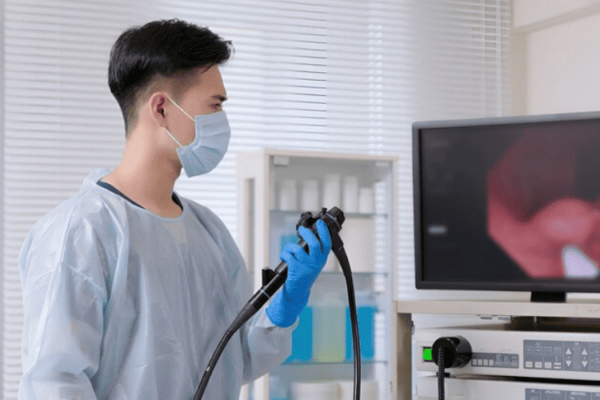
28 Apr GERD: Symptoms, Risk Factors and Treatments
GERD: Symptoms, Risk Factors and Treatments
By Island Hospital | April 28, 2025 08:00:00 AM
Do you often feel a burning sensation in your chest after eating—especially after a hearty meal? This frequent discomfort might be more than just an occasional bout of heartburn.
For many people, recurring acid reflux could be a sign of a more persistent condition known as Gastroesophageal Reflux Disease (GERD). While it’s easy to brush off the symptoms as minor, GERD can have a serious impact on your quality of life if left unmanaged.
What is GERD?
Gastroesophageal Reflux Disease (GERD) is a chronic digestive condition that occurs when stomach acid frequently flows back up into the oesophagus—the tube connecting your mouth to your stomach.
This backward flow of acid, known as acid reflux, can irritate the oesophagal lining and cause uncomfortable symptoms such as heartburn, chest discomfort, and a sour or bitter taste in the mouth.
Acid reflux itself isn’t unusual—many people experience it occasionally, especially after a large or spicy meal. It happens when the lower oesophagal sphincter (LES), a muscle that acts like a valve between the stomach and oesophagus, doesn’t close properly or opens too often, allowing acid to escape from the stomach and flow back into the oesophagus.
However, when acid reflux becomes frequent or severe, it may be a sign of GERD. This is typically diagnosed when:
- Mild reflux occurs at least twice a week, or
- Moderate to severe reflux occurs at least once a week
While occasional acid reflux is generally harmless, untreated GERD can lead to more serious health problems, including esophagitis (inflammation of the oesophagus), ulcers, or oesophagal strictures—a narrowing of the oesophagus that can make swallowing difficult.
Symptoms of GERD
GERD presents with a wide range of symptoms that can vary in severity and frequency. Understanding these symptoms is crucial for early diagnosis and effective management.
1. Heartburn
A burning sensation in the chest, usually after eating, which might be worse at night or when lying down.
2. Regurgitation
A sour or bitter-tasting acid backing up into your throat or mouth.
3. Chest pain
Discomfort or pain in the chest that can sometimes be mistaken for a heart attack.
4. Difficulty swallowing (dysphagia)
A feeling that food is stuck in your throat or chest.
5. Chronic cough
A persistent cough, especially at night.
6. Sore throat or hoarseness
Irritation of the throat due to acid exposure.
7. A sensation of a lump in the throat
A feeling that something is stuck without actually having anything there.
Struggling with frequent acid reflux? Discover the possible causes in this article on 8 Common Digestive Conditions You Might Be Experiencing.
Risk Factors and Complications
Anyone can experience acid reflux from time to time, but certain factors can increase your risk of developing GERD. Left untreated, GERD can also lead to more serious health complications.
Risk Factors for GERD:
- Obesity
- Pregnancy
- Smoking
- Hiatal hernia (A condition where part of the stomach pushes up into the chest)
- Certain medications
- Dietary habits
- Family history
Possible Complications of Untreated GERD:
- Esophagitis (Inflammation that can cause ulcers, bleeding, or pain)
- Oesophagal stricture (Narrowing of the oesophagus from scar tissue)
- Barrett’s oesophagus (Changes in the oesophagal lining)
- Chronic cough or respiratory problems
- Dental problems
Diagnosis of GERD
If you experience frequent or severe symptoms of GERD, a proper diagnosis is important to rule out other conditions and begin effective treatment. Doctors typically start by reviewing your symptoms and medical history, but additional tests may be needed if your symptoms are persistent, severe, or do not respond to initial treatment.
1. Medical History and Physical Examination
Your doctor will ask about your symptoms, lifestyle habits, and any medications you are taking. Sometimes, based on symptoms alone, a trial of treatment may be recommended first.
2. Upper Endoscopy (EGD)
A thin, flexible tube with a camera is inserted down your throat to examine the oesophagus and stomach. This test can detect inflammation, ulcers, strictures, or precancerous changes
3. Ambulatory Acid (pH) Monitoring
A small device is placed in your oesophagus to measure how often and for how long stomach acid flows back into it.
4. Esophageal Manometry
Measures the rhythmic muscle contractions of the oesophagus when swallowed
5. Barium Swallow (Upper GI Series)
Usually, before proceeding with X-rays, the patient is given a chalky liquid to drink. This liquid coats the digestive tract, making it easier to reveal any structural problems.
When to Visit a Doctor?
While occasional heartburn or acid reflux is common and usually not a cause for concern, you should see a doctor if you experience frequent or severe symptoms. Seeking medical advice early can help prevent GERD from leading to more serious health problems.
You should visit a doctor if you:
- Experience heartburn or acid reflux more than twice a week
- Have symptoms that persist despite using over-the-counter medications
- Find it difficult or painful to swallow
- Experience unintentional weight loss
- Have persistent nausea or vomiting
- Notice blood in vomit or black, tarry stools (possible signs of internal bleeding)
- Suffer from severe chest pain (especially if it spreads to your arm, jaw, or shoulder — seek emergency care immediately)
How to Improve GERD?
Managing GERD often involves making simple lifestyle changes combined with the right treatment plan. Small adjustments to your daily habits can go a long way in reducing symptoms and improving your overall quality of life.
1. Diet
Your eating habits play a big role in managing GERD symptoms. Foods and drinks that are spicy, acidic, or high in fat can easily trigger acid reflux, causing heartburn, regurgitation, and digestive discomfort.
Foods to Avoid:
- Spicy foods like chilli peppers and hot sauce.
- Fatty and fried foods like burgers and fries.
- Citrus fruits and juice,including oranges, lemons, and grapefruits.
- Tomato-based products like pasta sauce, ketchup, and salsa.
- Chocolate
- Caffeinated drinks
- Alcohol
- Carbonated beverages
- Mint and peppermint-flavored foods
While some foods can trigger GERD symptoms, others may help by reducing acid production, soothing and protecting the digestive tract, enhancing digestion, and relieving inflammation.
- Non-citrus fruits like bananas, apples, melons, papayas, and pears
- Vegetables like broccoli, carrots, green beans, and cucumbers
- Fermented food like kimchi
- Lean proteins like chicken breast, turkey, fish, and tofu
- Whole grains like oatmeal, brown rice, and whole wheat bread
- Dairy products like yogurt and skim milk
- Healthy fats like avocados, olive oil, and flaxseeds.
- Turmeric
- Omega-3 like Salmon
- Ginger
- Herbal teas like chamomile or licorice root
2. Lifestyle Changes
Beyond diet, daily habits and routines also play a fundamental role in managing GERD symptoms. Simple changes—like adjusting how you sleep, move, and manage stress—can help prevent acid reflux episodes and promote better digestive health overall.
- Maintain a healthy weight
- Eat smaller, more frequent meals
- Avoid lying down after meals
- Avoid trigger foods and drinks
- Elevate the head of your bed
- Wear loose-fitting clothes
- Adjust sleep position
- Quit smoking
- Manage stress
3. Home Remedies
If you’re looking for natural ways to ease GERD symptoms, home remedies can be a helpful addition to your routine. Many simple, everyday ingredients can help calm acid reflux and promote digestive comfort without the need for medication.
- Ginger
Ginger is known for its natural anti-inflammatory properties, which can help calm the stomach and reduce acid reflux. You can drink ginger-infused tea or chew a small piece of fresh ginger after meals to support digestion and ease symptoms.
- Baking Soda Water
Baking soda (sodium bicarbonate) acts as a natural antacid that can temporarily neutralize stomach acid. To use it for relief, mix ½ teaspoon of baking soda into a glass of water and drink it slowly. This simple remedy can help ease heartburn and acid reflux symptoms.
- Aloe Vera Juice
Aloe vera is well known for its soothing and anti-inflammatory properties, not just for the skin but also for the digestive system. Drinking aloe vera juice may help calm irritation in the oesophagus, reduce inflammation, and ease GERD symptoms.
- Chewing Gum
Chewing sugar-free gum after meals can help reduce acid reflux symptoms. Chewing stimulates the production of saliva, which helps wash acid back down into the stomach and neutralises acidity in the oesophagus.
- Apple Cider Vinegar
Some find that drinking a small amount of apple cider vinegar (ACV) before meals helps with digestion and reduces acid reflux symptoms.
- Slippery Elm
Slippery elm is a traditional herbal remedy known for its ability to soothe and protect the digestive tract. It contains a gel-like substance called mucilage, which coats the lining of the oesophagus and stomach, helping to relieve irritation caused by acid reflux.
4. Medicine
Managing GERD sometimes requires a combination of approaches. When lifestyle adjustments aren’t enough, medications can provide powerful support in controlling acid reflux, easing discomfort, and protecting your digestive health.
- Antacids
Provide quick, short-term relief by neutralising stomach acid. - H2 Receptor Blockers
Reduce acid production for longer relief than antacids. - Proton Pump Inhibitors (PPIs)
Strongly reduce stomach acid and promote healing of the oesophagus - Prokinetics
Help strengthen the lower oesophagal sphincter and improve stomach emptying.
5. Surgery and Procedure
For people with severe GERD symptoms, surgery or specialized procedures may be an option. These treatments are designed to strengthen the lower oesophagal sphincter, prevent acid reflux, and protect the oesophagus from long-term damage.
- Fundoplication
The most common surgical treatment for GERD. The top of the stomach is wrapped around the lower oesophagus to tighten the lower oesophagal sphincter and prevent reflux. - LINX Device
A small ring of magnetic beads is placed around the lower oesophagal sphincter. The beads allow food to pass through but help prevent stomach acid from coming back up. - Stretta Procedure
A non-surgical option where radiofrequency energy is delivered to the muscle of the lower oesophagus, helping it strengthen and reduce reflux over time. - Endoscopic Treatments
Newer minimally invasive options (like TIF — transoral incisionless fundoplication) that use an endoscope inserted through the mouth to tighten the oesophagal valve without external cuts.
Want to learn more about gastroenterology? Find the answers in our in-depth Gastroenterology FAQ on the specialists-in-charge, digestive health, and appointments.
What to Expect at Your GERD Appointment
If you’re planning to visit a doctor for GERD symptoms, understanding what to expect can help you feel more prepared and confident.
During your appointment, your doctor will likely start by asking about your symptoms, lifestyle habits, and medical history to get a full picture of your health. Depending on your situation, they may recommend diagnostic tests, suggest lifestyle adjustments, prescribe medications or refer you to a specialist for further evaluation.
What might happen during your visit:
- Detailed Symptom Discussion
Your doctor will ask about your symptoms, including how often you experience heartburn, regurgitation, chest discomfort, difficulty swallowing, or any other related issues. - Lifestyle and Diet Review
You’ll be asked about your daily habits, such as eating patterns, smoking, alcohol intake, physical activity, and stress management. - Physical Examination
A general physical exam may be performed to check for any signs of complications related to GERD. - Possible Diagnostic Tests
If necessary, your doctor may recommend tests like an endoscopy, 24-hour pH monitoring, or oesophagal manometry. - Treatment Plan Discussion
After gathering all the information, your doctor will discuss your treatment options. This may include lifestyle modifications, dietary adjustments, medications, or planning for further evaluations or procedures.
Who Should I Consult?
If you’re experiencing frequent or severe GERD symptoms, it’s best to consult a gastroenterologist— a specialist trained to diagnose and treat digestive disorders.
At Island Hospital, our team of experienced gastroenterology specialists provides comprehensive care tailored to each patient’s needs. Whether you require detailed diagnostics, medical therapy, or advanced treatment options, Island Hospital is equipped to support your journey to better digestive health.
Check out our list of Island Hospital specialists below and book your consultation today!

Get Expert Help for Lasting GERD Relief!
Living with GERD can be challenging, but with the right care, effective relief is possible. From lifestyle changes and home remedies to advanced medical treatments, managing GERD is about finding the approach that works best for you.
If you’re experiencing persistent acid reflux, heartburn, or any symptoms of GERD, don’t wait to seek help.
At Island Hospital, our team of experienced gastroenterologists specialises in diagnosing and treating a wide range of digestive disorders, including GERD. With access to advanced diagnostic technology and personalized treatment plans, we’re committed to helping you feel your best again.
Let us guide you through your journey to recovery — Schedule an appointment today!
FAQs
Is there a cure for GERD?
There is no permanent cure for GERD, but it can be effectively managed. With the right combination of lifestyle changes, medications, and in some cases, procedures or surgery, most people can control their symptoms and live comfortably. Long-term management is important to prevent symptoms from returning.
Do babies get GERD as well?
Yes, babies can develop GERD, but it often looks different from adults. In infants, GERD typically causes frequent spit-up, irritability during feeding, poor weight gain, or trouble sleeping.
While mild reflux (spitting up) is common and usually harmless in babies, true GERD is more serious and may require medical attention. Most babies outgrow GERD as their digestive systems mature, usually by their first birthday.
How should you sleep with GERD?
To reduce GERD symptoms at night, sleep with your upper body elevated and lie on your left side.
Raising the head of your bed by 6 to 8 inches or using a wedge pillow can help prevent acid from flowing back into the oesophagus. Sleeping on your left side can also improve digestion and reduce reflux.
Will GERD go away if I lose weight?
Losing weight can significantly improve GERD symptoms and, in some cases, even eliminate them. Excess weight puts pressure on the abdomen, pushing stomach acid up into the oesophagus.
By losing weight—especially around the belly—you can reduce this pressure, lower the frequency of acid reflux episodes, and make other treatments more effective. However, some people may still need additional lifestyle changes or medication even after weight loss.
What exercise is good for acid reflux?
Low-impact exercises like walking, yoga, light jogging, and cycling are good for managing acid reflux. These activities help improve digestion, maintain a healthy weight, and reduce pressure on the stomach without triggering symptoms.
It’s best to avoid high-intensity workouts that involve heavy lifting, bending, or sudden movements right after eating, as they can worsen acid reflux.
Don’t Ignore the Signs – Take Control of Your Digestive Wellness Today

Your digestive health plays a vital role in your overall well-being, and early detection of gastrointestinal issues is key to preventing serious complications like GERD and beyond.
At Island Hospital, our Executive Health Screening Package offers a comprehensive check-up designed to catch potential problems early — even before symptoms arise.
For RM760, you’ll receive expert care, advanced diagnostic tests, and a personalized consultation to help you stay ahead of your health.
What’s Included in Your Screening Experience:
- Comprehensive blood tests
- Chest X-ray
- Electrocardiogram (ECG)
- Ultrasound abdomen & pelvis
- Urine analysis
- Physical examination and detailed consultation
Take a proactive approach to your health — this screening package helps detect potential issues early, so you can manage conditions like GERD before they become serious.













